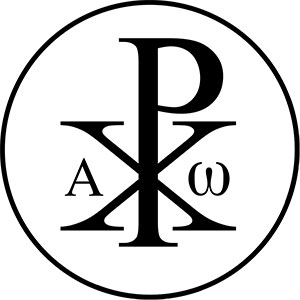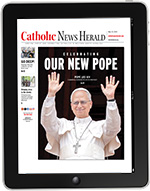Credo: A 12-part series on the creed
Editor's note: This article is the third of 12 in a new series on the Creed by Deacon Matthew Newsome. Explore the series.
 The third article of the Apostles’ Creed states that Jesus Christ, whom we identified last month as Lord and God, “was conceived by the power of the Holy Spirit and born of the Virgin Mary.” In other words, the very same Lord and God who is the Second Person of the Holy Trinity became, for our sake, one of us. We refer to this mystery of the faith as the incarnation.
The third article of the Apostles’ Creed states that Jesus Christ, whom we identified last month as Lord and God, “was conceived by the power of the Holy Spirit and born of the Virgin Mary.” In other words, the very same Lord and God who is the Second Person of the Holy Trinity became, for our sake, one of us. We refer to this mystery of the faith as the incarnation.
St. John begins his gospel with this mystery: “In the beginning was the Word, and the Word was with God, and the Word was God… And the Word became flesh and made His dwelling among us” (Jn 1:1, 14a). “The Word became flesh” in Latin is “verbum caro factum est.” The Basilica of the Annunciation in Nazareth is constructed over the grotto where, according to ancient tradition, Gabriel appeared to Mary. There you will find that same Latin phrase inscribed upon an altar, with the addition of a single word: “verbum caro hic factum est.”
That little word “hic” is significant: it means “here.”
The mystery of the incarnation is not merely a spiritual reality, nor is it a fairy tale. It is a true event that took place in history at a certain place, at a certain time. You can’t use a time machine to travel to that time, but you can use a plane and a bus to travel to that place, as millions of people have done over the centuries. The incarnation is the most significant thing that has ever happened since the creation of the world.
‘According to your word’
As recounted in Luke’s and Matthew’s gospels, there in Nazareth of Galilee, about a day’s walk north of Jerusalem, the angel Gabriel appeared to a virgin to announce that she would conceive and bear a son who “will be great and will be called Son of the Most High,” and who would rule over an eternal kingdom (Lk 1:31-33). When Mary wondered how this would come about, since she was a virgin, the angel replied, “The holy Spirit will come upon you, and the power of the Most High will overshadow you. Therefore the child to be born will be called holy, the Son of God” (Lk 1:35). Miraculously, God preserved Mary’s vocations of both virginity and motherhood.
Mary’s faithful response, “May it be done to me according to your word” (Lk 1:38), has become a model for all Christians of openness to the will of God, even when what God asks seems impossible.
The child born of Mary nine months later, a human child with a human mother, is the same divine Son of God begotten of the Father from all ages. This union of human and divine natures in the one Person of Jesus Christ is called, in theological terms, the “hypostatic union.” It means that the two natures of Christ are united in one Person such that nothing of either is lost. Jesus is not like the demigods of Greek mythology. He is not half-man and half-god, but fully both. Nor can we speak of a division between “the human Jesus” and “the divine Son of God” as two different people occupying the same body. Every divine attribute of the Father is shared with the Son, who also possesses every aspect of human nature, including a human mind, a human will and a human soul. The only aspect of humanity Jesus does not share with us is sin, which is not something inherent to our nature but something we experience because of the Fall.
Partakers of divine nature
The humanity of Jesus is a perfect humanity. Christ is called the “New Adam” because in Him mankind has a new beginning. God became incarnate not only to free us from sin, but for something even greater. To merely free us from sin would be to restore us to the state of original grace enjoyed by our first parents. But God calls us to a higher destiny. As the Catechism puts it, “The Word became flesh to make us partakers of the divine nature” (CCC 460).
This is called “divinization” in the East, or “sanctification” in the West; to become holy or to become like God. The way St. Athanasius puts it in his seminal work, “On the Incarnation,” is that “the Son of God became man so that we might become God.” This doesn’t mean we literally become other gods, but that we become god-like because we have the life of God within us.
This is not something any human being, no matter how perfect or sinless, could ever achieve on our own. But what is impossible for us is not impossible for God. We cannot ascend to God, so God descends to us, unites Himself to our nature, and draws us to heaven with Him. The incarnation is an act of infinite humility for God. As St. Paul puts it, Christ “empties Himself, taking the form of a slave, coming in human likeness; and found human in appearance, He humbled Himself, becoming obedient to death, even death on a cross” (Phil 2:7-8).
Good news of our salvation
When we think of the great work of redemption won by Christ, we naturally think of His passion and death. Indeed, the only thing we might say that God “gained” in the incarnation is the ability to die, which He then uses to show His great love for us. As John’s gospel says, there is no greater love than to lay down one’s life for a friend. God shows the greatness of His love by dying for us while we were yet His enemies (Rom 5:8).
It is important for us to consider now, however, that the good news of our salvation was proclaimed first not at Christ’s death but at His birth, when the angel announced to the shepherds, “I proclaim to you good news of great joy that will be for all the people. For today in the city of David a savior has been born for you who is Messiah and Lord” (Lk 2:10-11).
Even before the Resurrection, Jesus proclaimed the kingdom of God to be at hand. The heavenly city described in Revelation as the New Jerusalem is heavenly not because of the pearly gates or the streets of gold, but because God dwells there with the human race (Rev 21:3). When we call Jesus “Emmanuel” (God-with-us), we acknowledge that God dwells with us here and now, not only during the 33 years He walked the earth as a man. The Word still dwells among us today in the Church and in the sacraments. The incarnation is more than an historical event, it is an ongoing reality. This makes it possible for those of us united to the incarnate Son of God in baptism, as members of His Body, to experience something of heaven even now.
Deacon Matthew Newsome is the Catholic campus minister at Western Carolina University. He is the author of “The Devout Life: A Modern Guide to Practical Holiness with St. Francis de Sales,” available now from Sophia Institute Press.



